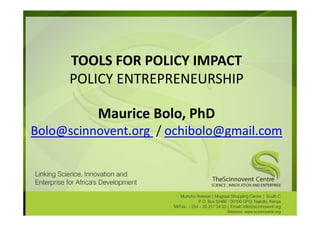
Policy entrepreneurship in influencing policy change [compatibility mode]
- 1. TOOLS FOR POLICY IMPACT POLICY ENTREPRENEURSHIP Maurice Bolo, PhD Bolo@scinnovent.org / ochibolo@gmail.com
- 2. TYPES OF POLICY ENTREPRENEURS Four broad styles exist: •Story-tellers •Networkers •Engineers •Fixers Which one are you?
- 3. WHICH KIND OF POLICY ENTREPRENEUR ARE YOU? Based on a self assessment questionnaire developed by the ODI Helps you to capitalize on your strengths; develop your weaknesses and improve the policy impact of your work Take the assessment now
- 4. WHAT ARE THE RESULTS? •A low score indicates that you make extensive use of a particular style of entrepreneurship •A high score indicates that you make little use of a particular style •Most people use all the four different styles at different times •It is not necessary to be adept at every style •However, under –use/over-use may mean that you need to re-balance your styles or find partners with compensating strengths
- 5. WHAT ARE THE RESULTS? For all the questions: •Answers for (a) correspond to story-teller •Answers for (b) correspond to networker •Answers for (c) correspond to engineer •Answers for (d) correspond to fixer –A score of 37 means you use them equally –For each type less than 30 is low; less than 23 is very low –For each, more than 44 is high; more than 52 is very high –Remember, the total of your scores should be 150
- 6. STORY-TELLERS •Story-telling is important for changing policy •Policy makers make sense of complex realities through simplified stories/scenarios •NB: sometimes narratives can be misleading and counter-narratives always emerge...but this doesn’t diminish the importance of narratives in shaping policy •Some powerful narratives in the past include: structural adjustment; debt relief as the answer to poverty reduction; aid-for-trade etc •Successful policy entrepreneurs need to be good story-tellers
- 7. NETWORKERS •Policymaking takes place within communities of people who know and interact with each other •To influence policymakers, you need to join their networks •You are either inside the tent or outside •If you are inside, your voice will be heard, if you are outside, you will not be heard •Researchers who are good networkers are more likely to influence policy than those who are not
- 8. ENGINEERS •There often can be a huge gap between what policy makers think they are doing and what actually happens on the ground •Researchers need to work not just with senior level policymakers but also with ‘street level bureaucrats’ •Researchers need to become practically involved in testing their ideas if they expect policymakers to heed their recommendations
- 9. THE FIXERS •This is about understanding the policy and political process •Knowing when to make your pitch and to whom •You need to know your source of power: Physical power; resource power; position power; expert power; personal power etc ......Then exploit it
